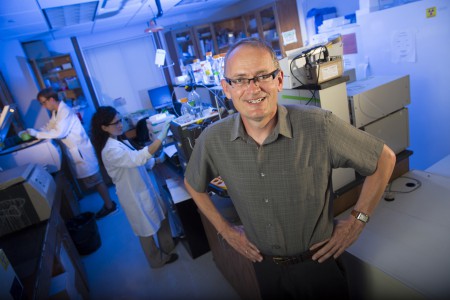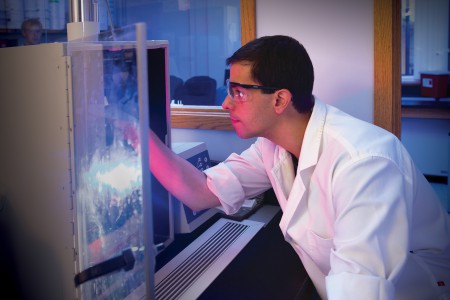New Research Center Targets Obesity at Molecular Level
Understanding obesity at the molecular level is a crucial first step toward curbing this national epidemic. That’s the ultimate goal for scientists in UNL’s newest research center.
Leveraging strengths in nutrition and health research, UNL established the Nebraska Center for the Prevention of Obesity Diseases through Dietary Molecules, or NPOD, in 2014. An $11.3 million, five-year grant funds this National Institutes of Health Center of Biomedical Research Excellence.
The long-term aim is for the center to become a leader in nutrient signaling and prevention of obesity and obesity-related diseases, including non-alcoholic fatty liver disease, cardiovascular disease and Type 2 diabetes, said center director Janos Zempleni, Willa Cather Professor of Molecular Nutrition.
“This combined focus makes NPOD unique in the U.S. and globally,” he said. “Through this center, we’ll develop science-based strategies using dietary compounds to improve human health.”
Nutrient signaling research explores how nutrients initiate biochemical chain reactions that cause a cellular response, including fat storage and disease-causing inflammation. Many nutrient-dependent signaling pathways await discovery and are promising targets for consumer-friendly, cost-effective methods to prevent and treat obesity-related diseases, Zempleni said.
“Through this center, we’ll develop science-based strategies using dietary compounds to improve human health.”
For example, researchers are studying how certain dietary fatty acids activate molecular pathways that turn fat-storing white cells into beige fat cells, which burn calories. Others are investigating how good fatty acids prevent non-alcoholic fatty liver disease and how diet contributes to gut microbial flora, which, in turn, inhibit inflammation.
The University of Nebraska Medical Center collaborates on the center, which aims to establish a community of nationally recognized researchers in nutrition, genetics, biochemistry, food science, immunology and computer science. To build research expertise, experienced faculty will mentor early career scientists. The center also is developing a research core facility in molecular biology, bioinformatics and biostatistics.
“Obesity is a national health crisis that costs the U.S. hundreds of billions of dollars annually in health care expenses and lost productivity,” Zempleni said. “Our research will help address these issues.”





